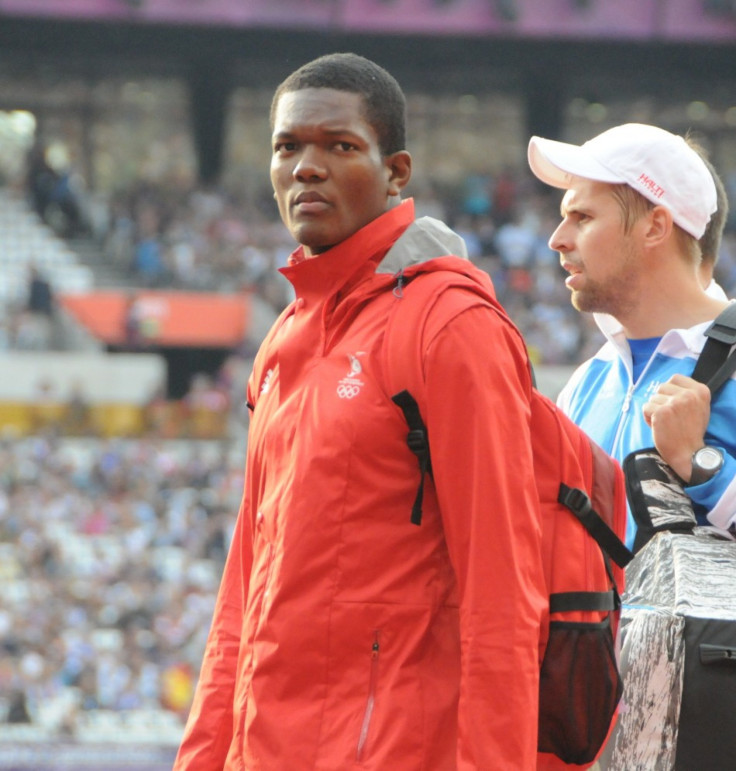Kershorn Walcott, Olympic Gold Champion, Provides Trinidad And Tobago With Something To Celebrate
ANALYSIS

Kershorn Walcott, the gold medal winner in the men’s javelin throw competition at the London Olympics, has received a tumultuous welcome in his native Trinidad and Tobago.
The 19-year-old is not only the biggest hero the island has seen in decades, but he has been rewarded with a $2.5-million property, a gift of $1-million in cash from Prime Minister Kamla Persad-Bissessar, and a scholarship to attend the University of Trinidad and Tobago.
"For bringing us such pride and recognition to the nation of Trinidad and Tobago, Keshorn Walcott will receive 20,000 square feet, that is, four lots of land in Toco," Persad-Bissessar said.
"A housing project to be called the Keshorn Walcott Housing Development will be established. This development will bring housing and employment to [his hometown of ]Toco."
If all that wasn’t enough for the teenager, he will also have a historic lighthouse and a Caribbean Airlines aircraft named after him.
Trinidad and Tobago has won only two Olympic gold medals in its history (the last one was 36 years ago at the Montreal games). Moreover, Walcott excelled in a sport traditionally dominated by Europeans.
Walcott’s accomplishments presents some good news for a country desperately in need of some.
Beset by racial strife, crime and violence, Trinidad and Tobago is also afflicted by endemic drug violence and gangs. The situation became so bad that last summer the Prime Minister imposed a state of emergency which granted the police and army special powers to tackle gangs – the measure was widely supported by a populace tired of disorder. (The emergency order was lifted by the end of 2011).
In 2010, the tiny island of a little more than 1-million people had a homicide rate of 36 per 100,000 – seven times the rate in the U.S.
Much of the killing is fuelled by the drug trade -- Trinidad’s proximity to the coast of South America (just 7 miles away) makes it an ideal hub for cocaine destined for drug markets in North America and Europe.
The United States is so concerned that it has poured in tens of millions of dollars into the small nation to upgrade its security and customs practices.
In response to the waves of murders, Trinidad’s government confiscated hundreds of weapons and arrested dozens of suspected criminals and drug dealers.
Still, the killings continue.
Just last month, two Chinese businessmen were shot and killed in a robbery in the capital city of Port-of-Spain, sparking demands from the Chinese community that the government clamp down on crime.
The U.S. State Department warned of the situation in Trinidad and Tobago: “The incidence of violent crime remains high on both islands and affects local and expatriate communities, and tourists… Violent crimes, including assault, kidnapping for ransom, sexual assault and murder, have involved expatriate residents and tourists… Burglaries of private residences are common. Robbery is a risk, particularly in urban areas.”
In an editorial for the Trinidad Express Newspaper, Rajiv Gopie wrote: “Crime is the issue that pervades the consciousness of Trinidad and Tobago. It is the ubiquitous topic that occupies the forefront of current life. Apart from the daily shock of the horrific acts of violence being committed in our country, the inevitable discussion is about what can be done to control and stop crime? This is no easy question and, sadly, history has shown that we have failed spectacularly in all of our efforts to do so.”
Trinidad and Tobago, like Guyana, is also polarized by race.
East Indians (descended from indentured servants) account for about 40 percent of the population, black Africans (descended from slaves) represent about 38 percent; with the remainder either of mixed race or other ethnic groups, according to the CIA World Factbook.
Walcott is black, while Persad-Bissessar is Indian.
”Since [1986], we have had a succession of governments made up of either predominantly Indo-Trinidadians, or mainly Afro-Trinidadians,” wrote Therese Mills, editor of the daily Trinidad and Tobago newspaper Newday for BBC.
“And whoever is in power accuses the other of racial discrimination.”
The United Nations explained in a report on Trinidad and Tobago that relations between blacks and Africans are uneasy.
Blacks dominated the economy and politics of the islands until Indians emerged as a powerful force just about three decades ago.
“There exists a fundamental mistrust between Indians and Africans in the mass, a rivalry that dates from the Indian's arrival to replace the Africans as plantations worker in the wake of Emancipation,” the UN stated.
“Each has traditionally accused the other of wanting to ‘take over’ the country, and the two groups monitor each other's numbers with mindful apprehension.”
The UN report added: “Africans perceive Indians as taking over the economy of the country, because Indians are so visibly engaged in business activity, ranging from the selling of vegetables by the roadside to ownership of the sophisticated hardware store, whereas Africans have chosen a different route to success, the way of education. What has perhaps exacerbated relations in the past few years is that Indians have now caught up in education. With the increase in oil revenue, the incumbent government was able to dramatically increase educational facilities, notably at secondary level. This have given the Indians a new ubiquity which disturbs their African counterparts: the Indian who was once safely tucked away out of sight in the canefield, the rice patch or the family vegetable garden, is now turning up everywhere, in every kind of job. Africans feel upstaged, threatened and Indians feel their resentment.”
© Copyright IBTimes 2025. All rights reserved.





















